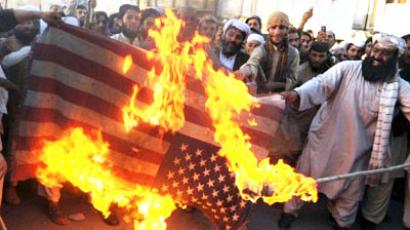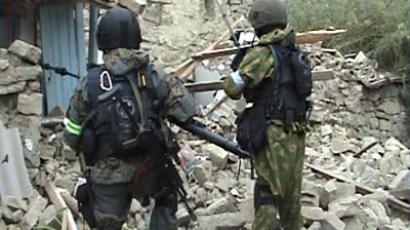Pakistan seals border in response to NATO attack
Pakistan has closed a key Afghan border crossing to NATO supplies after the US-led coalition's helicopters allegedly fired on a checkpoint in northwest Pakistan, killing 24 soldiers and wounding around fourteen.
Pakistan’s state TV quoted the military as saying the helicopter attack occurred on Friday night in the Mohmand tribal area near the Afghan border. A customs official has confirmed that he received a verbal order to stop all NATO supplies from moving across the border through the Torkham crossing, reports the Associated Press.The Alliance’s officials in Kabul said they were aware and are investigating the incident. Top NATO and US commander in Afghanistan Gen. John Allen issued a statement Saturday offering condolences to any members of the Pakistan security forces who might have been killed or injured. According to Reuters, later in the day a NATO spokesman confirmed Pakistani soldiers had died in the cross-border incident, but provided no details on the number of casualties.However NATO has not officially claimed any responsibility so far.Reuters reported that Pakistan's foreign office had called the NATO/ISAF raid “a flagrant violation of sovereignty.”"The Pakistani government cannot tolerate such actions against its army. God willing, we will take up this issue at the relevant forum. We will not only protest, but we will prove through certain actions that the Pakistani government cannot tolerate such kind of actions," AP quotes Pakistani Information Minister Firdous Aashiq Awan as saying.Last year, US helicopters accidentally killed two Pakistani soldiers near the border, prompting Pakistan to temporarily close its frontier to supplies being shipped through the country to NATO troops in Afghanistan.
Ahmed Quraishi from the lobbying group the PakNationalists forum told RT that public outrage will force Pakistan's government to react decisively.“The Pakistani government and military are in a very difficult position. [They] will have to do something that would pacify not just public opinion, but also the soldiers and the officers of the Pakistani army,” he told RT. “The feelings against what the United States [are] doing in Afghanistan, the way the Pakistani interests are being ignored… there is a whole list of grievances and this is just the latest.”
John Rees, a political analyst from the British-based Stop the War Coalition, says that the US and its allies are creating an explosive situation in the already volatile region.“Whether or not it’s a big issue for Washington, it should be a big issue for the rest of us,” he told RT. “After all, Pakistan is a nuclear state, the region is unstable, the border with Afghanistan is used as a constant pretext for drone attacks within Pakistani territory.”Rees notes that the US military refers to the whole area as ‘AfPak’, as if it was one single state, and this is a dangerous approach, he says.“If a puppet regime, and it is a puppet regime in Afghanistan, is so horrified by the attack on Pakistan that it is saying that it will back Pakistan against the countries that are occupying Afghanistan, I think you can see quite how far this has now run,” Rees said.“I think what the United States and its allies, NATO allies, have done is an extremely dangerous incursion. I’m not surprised at the anger of the Pakistani people,” he added. “I think that the message should go very, very clearly for the United States and its allies: ‘You are playing with fire, you are risking greater instability in an already unstable region, and this kind of behavior simply has to stop, it’s gangsterism.”














